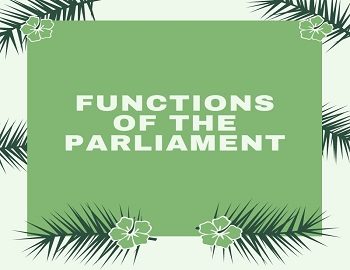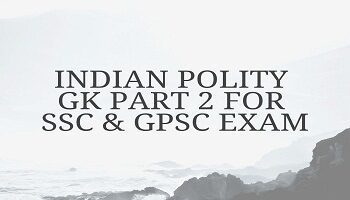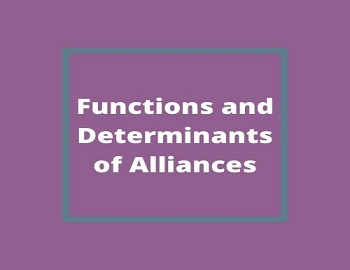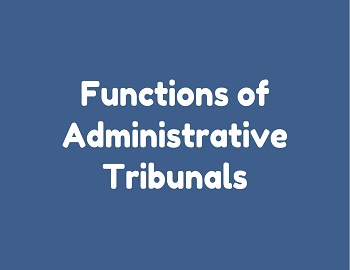Functions of the Parliament:
India has adopted a parliamentary form of government in which a harmonious relationship between the executive and legislature is brought about through the executive being formed out of the legislature which enjoys the confidence of the Parliament. Parliament is the supreme legislature and the most important wing of the Government, which apart from making law performs many other essential functions. Thus, Parliament is basically a multi-functional institution which under the Constitution of India consists of the President, the Lok Sabah and the Rajya Sabha (Article 79).
The most important and principal function of Parliament is to legislate i.e. to make laws for the benefit of the country. It has been vested with the powers to make laws on all subjects enumerated in Union List and Concurrent List. Under some circumstances, it can make laws on the subjects of the State List as well. Parliament also enjoys legislative power on the residuary subjects.
To provide the Council of Ministers including the Cabinet and to hold it responsible is the other important function of the Parliament. Though the Council of Ministers is responsible to the popular House or Lok Sabha but the membership of it is not the sole province of Lok Sabha. Every Council of Ministers has some members from the upper chamber, though it is the prerogative of the Prime Minister to choose his ministers.
The Parliament exercises effective control over the executive wing of the government. Under the Parliamentary system of Government, the control of the executive is realized through the theory of ministerial responsibility and the collective responsibility of the Council of Ministers. The executive can stay in office so long as it enjoys the confidence of the majority in the lower chamber i.e. the Lok Sabha (popular chamber). Each minister is responsible for the acts of the officers of his department and must answer questions regarding his department’s affairs in the Parliament. Again, the Council of Ministers as a body is responsible to Parliament for the general conduct of the affairs of the Government. As a result of this principle, a vote of no confidence against any one minister is tantamount to a vote of no confidence against the whole Council of Ministers. The Council of Ministers swims or sinks together. In this respect, it would be right to say that the responsibility of the executive is direct, continuous and concurrent. The lack of parliamentary confidence in the government may be expressed by the House of People by-
- passing a substantive motion of no-confidence in the Council of Ministers.
- passing a censure motion.
- passing an adjournment motion.
- defeating the government on a financial measure.
The Parliament also exercises financial control over the Executive. It has sole control over the finances of the country. No tax can be levied and no money can be spent out of the Consolidated Fund of India without the authorization by the Parliament, though the charged expenditure is not submitted to vote of the Parliament. The Lok Sabha possesses the financial power in this respect.
The Parliament is an authentic source of information. It provides opportunity to deliberate on various issues, policies and measures through debates, questions and other parliamentary procedures before their implementation. It is an authentic and authoritative forum from where all the information concerning the public and public policies are disseminated to the nation.
Another important function of the Parliament is constituent function i.e. the power of amendment to the constitution. Under the provisions of the Indian Constitution, the exclusive power to propose and initiate an amendment lies with the Parliament. Except on federal subjects, in which the ratification of not less than half of the States is required. Parliament can bring alteration to all the provisions of the Constitution save the basic structure.
Thus, Parliament is a multi-functional institution which apart from legislative business, has many important other businesses to do as we saw earlier.









Comments (No)